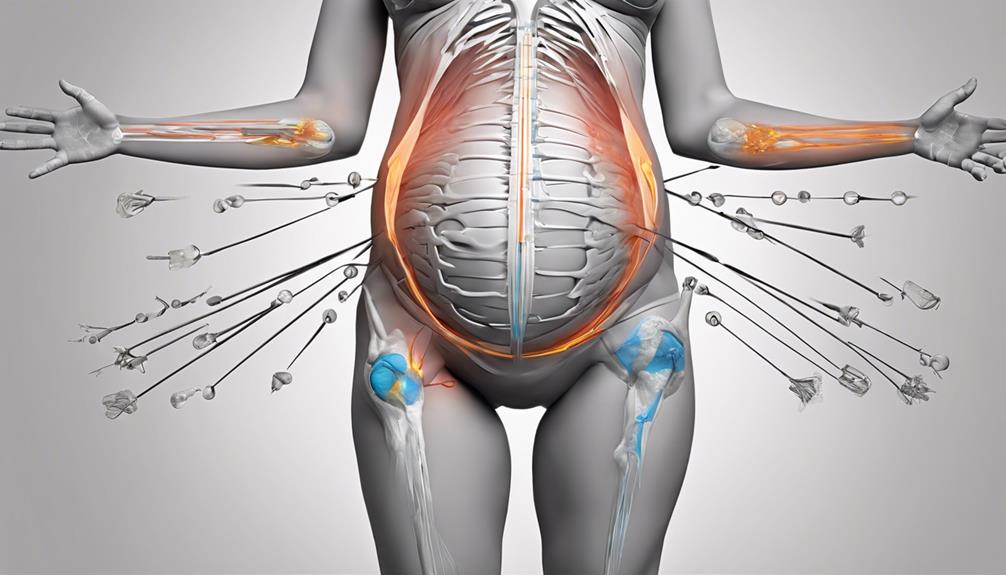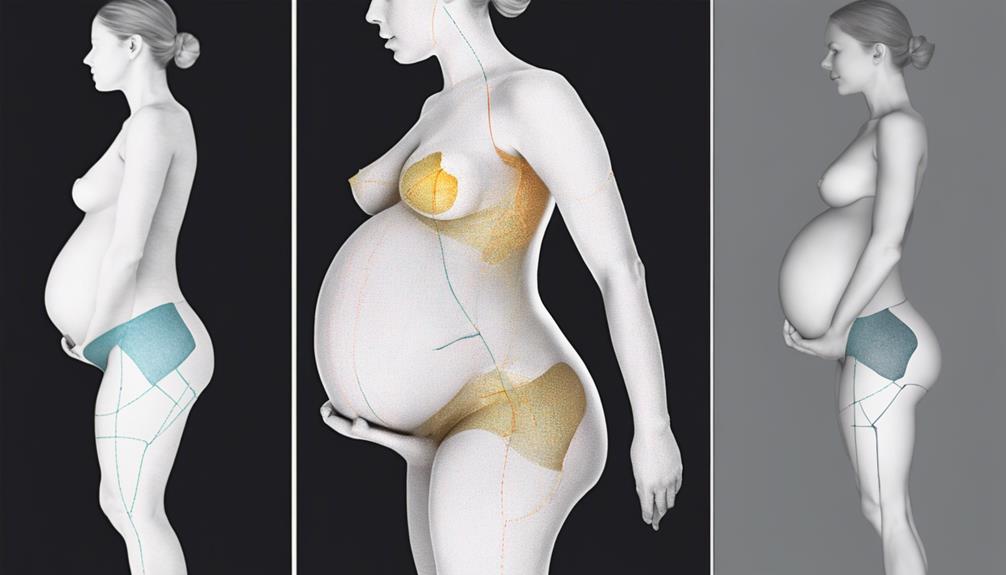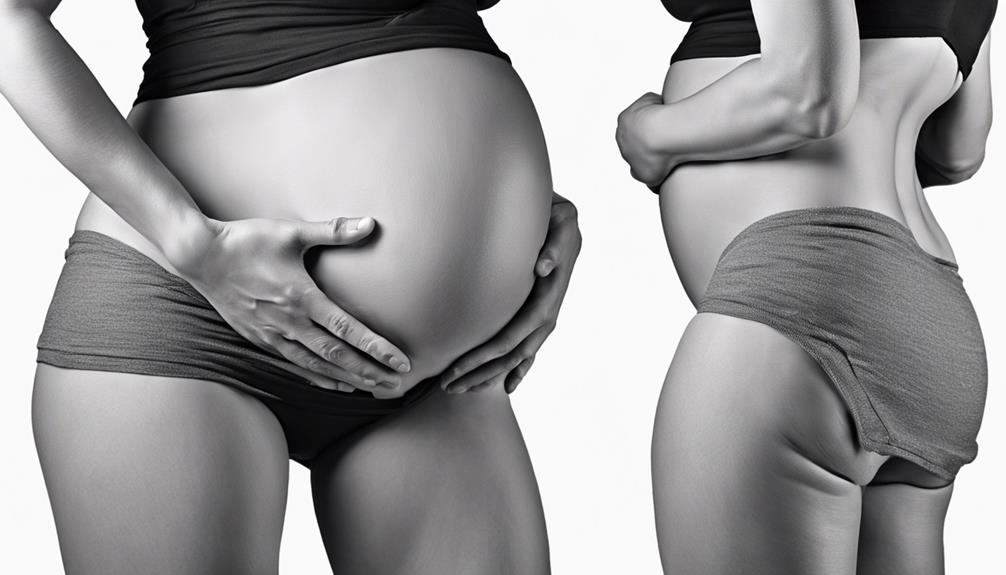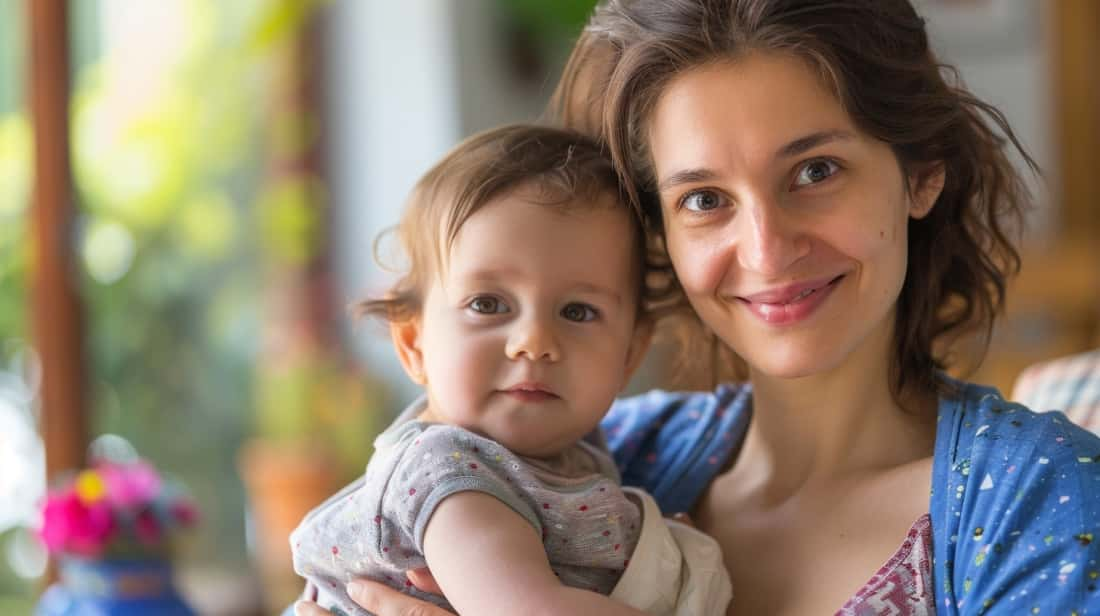Many expectant mothers may wonder why they experience hip pain in the first trimester of pregnancy.
The mystery behind this discomfort lies in the intricate interplay of various factors such as hormonal shifts, bodily adjustments, and the strain on supporting structures.
Understanding the root causes of this ailment can shed light on effective coping mechanisms and treatments to ease the burden of hip pain.
Key Takeaways
- Hormonal changes and relaxin release soften ligaments, contributing to early pregnancy hip pain.
- Weight gain from a growing uterus strains hips and shifts alignment, causing discomfort.
- Posture shifts and pelvic bone adjustments exacerbate hip pain in the first trimester.
- Understanding hormonal effects, weight gain impact, and pain relief strategies help manage early pregnancy hip discomfort.

ChongErfei Maternity Belt, Pregnancy 3 in 1 Support Belt for Back/Pelvic/Hip Pain, Maternity Band Belly Support for Pregnancy Belly Support Band (L: Fit Ab 39.5"-51.3", Beige)
✅RECOMMENDED BY OBSTETRICIANS: Medical studies show wearing a high quality maternity support belt, helps to promote a healthier…
As an affiliate, we earn on qualifying purchases.
As an affiliate, we earn on qualifying purchases.
Causes of Early Pregnancy Hip Pain
During early pregnancy, we commonly experience hip pain due to hormonal changes and the release of relaxin, a key factor in loosening ligaments and joints. The pelvic area pressure from the expanding uterus in the first trimester can also contribute to discomfort in our hips. As our bodies adjust to the changes, posture shifts and altered weight distribution can lead to added strain on our hip joints, causing pain.
Additionally, the pelvic bone and ligament shifts that occur early in pregnancy may further exacerbate this discomfort. While rare, ectopic pregnancy can manifest as hip pain in the first trimester, along with symptoms like shoulder pain and vaginal bleeding. Understanding and responding to our bodies during this time, seeking support and guidance from healthcare providers if the hip pain becomes severe or is accompanied by other concerning symptoms is crucial.

Boppy Wedge Pregnancy Pillow – Compact Support Wedge Maternity Pillow for Back, Knees, Pelvic Floor at Home, Office & Travel with Washable Knit Cover – Gray Modern Stripe
Belly support made easy: Our Wedge pillow is a compact and versatile solution that allows you to stay…
As an affiliate, we earn on qualifying purchases.
As an affiliate, we earn on qualifying purchases.
Impact of Hormonal Changes

The impact of hormonal changes in early pregnancy, particularly the increased levels of relaxin, can greatly contribute to hip pain experienced by expectant mothers. These changes play an essential role in preparing the body for the physical demands of pregnancy and labor.
Here's how hormonal fluctuations affect hip pain:
- Softening of Ligaments: The relaxin hormone softens ligaments and joints, including those in the hip area, which can lead to discomfort.
- Pelvic and Hip Joint Affection: Increased blood flow and hormonal shifts can impact the stability of the pelvis and hip joints, contributing to pain.
- Preparation for Labor: The body undergoes significant hormonal changes during the first trimester to prepare for the physical demands of labor, which can manifest as hip pain.
- Stability Concerns: Hormonal changes in early pregnancy can affect the stability of the hip joints, leading to feelings of instability and discomfort.
Understanding how hormonal changes influence hip pain is essential for expectant mothers to manage and alleviate discomfort during this essential stage of pregnancy.

Vive Pregnancy Belly Support Band for Women – Maternity Belt – Cozy Brace for Moms, for Pelvic, Lower Back, and Hip Pain Relief – Soft, Breathable, Adjustable Fit for Easy Movement – Black (Large)
GENTLE BELLY AND BACK SUPPORT: The maternity support belt offers light compression and lifting to reduce strain on…
As an affiliate, we earn on qualifying purchases.
As an affiliate, we earn on qualifying purchases.
Role of Relaxin Hormone
As we explore the impact of hormonal changes on hip pain in early pregnancy, the crucial relaxin hormone emerges as a key player in the discomfort experienced by expectant mothers. Released in the first trimester, relaxin hormone serves an essential role by loosening ligaments and joints in the pelvis to prepare the body for childbirth.
However, the increased levels of relaxin hormone can also lead to hip pain during this period. This hormone's effect on pelvic stability can result in feelings of instability and discomfort in the hip area. By promoting flexibility in the pelvis, relaxin hormone contributes to the body's ability to adapt to the changes necessary for pregnancy.
Understanding the role of relaxin hormone in the first trimester highlights how the body's natural processes can sometimes lead to temporary discomfort, such as hip pain, as it prepares for the journey of pregnancy and childbirth.

Momcozy Pregnancy Pillows for Sleeping, U Shaped Full Body Maternity Pillow with Removable Cover – Support for Back, Legs, Belly, HIPS for Pregnant Women, 57 Inch Pregnancy Pillow for Women, Grey
Ergonomic Supportive Pillow – Momcozy full body pillow designs to replace the needs of multiple bed pillows, it…
As an affiliate, we earn on qualifying purchases.
As an affiliate, we earn on qualifying purchases.
Effects of Weight Gain

Experiencing weight gain in early pregnancy can place added stress on the hip joints and pelvis, potentially leading to increased pressure and discomfort. Here are some key points crucial to bear in mind:
- Growing Uterus and Fluids: The additional weight from a growing uterus and pregnancy-related fluids can strain the hips, contributing to discomfort.
- Shifting Center of Gravity: Extra weight gain can shift the body's center of gravity, affecting hip alignment and causing pain.
- Hormonal Changes: Hormonal fluctuations and increased blood volume associated with pregnancy can impact the body's support system, exacerbating hip discomfort.
- Managing Weight Gain: Maintaining a healthy diet and engaging in light exercise can help alleviate hip pain during the first trimester.
Understanding how weight gain affects the hip joints and pelvis is pivotal in managing discomfort during early pregnancy. By being mindful of these factors and taking steps to support your body, you can help alleviate the pressure and discomfort associated with hip pain.
Strategies for Pain Relief and Management
Stretching gently and maintaining good posture are effective strategies for relieving and managing hip pain in the first trimester of pregnancy. Hormonal changes and the body adjusting to pregnancy can lead to discomfort in the hips, heightened by ligament and muscle stretching as the uterus expands.
Engaging in gentle stretching exercises can help ascertain some of the tension and pain. Additionally, focusing on confirming good posture throughout the day can reduce strain on the hips.
Applying heat packs or enjoying warm baths can also provide relief for sore and achy hip muscles during this early stage of pregnancy. It's essential to consult with a healthcare provider to confirm that the pain management strategies are appropriate and safe for both the mother and the developing baby.
Can Tailbone Pain in Pregnancy’s First Trimester Cause Hip Pain as Well?
Yes, tailbone pain in the first trimester of pregnancy can cause hip pain as well. The added weight and change in posture can put pressure on the tailbone and hips. Some tips for tailbone pain relief during pregnancy include using a cushion when sitting, practicing good posture, and doing gentle stretches.
Conclusion
As we navigate through the rollercoaster of pregnancy, our bodies go through incredible changes that can result in hip pain during the first trimester.
Just like a flower blooming in spring, our hips are opening up to make room for the new life growing inside us.
By understanding the causes and implementing pain relief strategies, we can embrace this journey with grace and strength.
Remember, you're not alone in this beautiful transformation.









